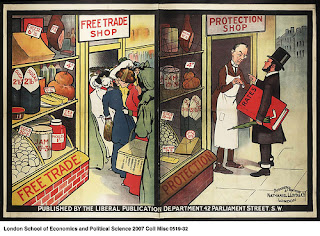 |
| Hope the pigeons don't get it! |
 |
| More Strawberries |
The Broad Beans (and Artichokes) have a bit of Blackfly (actually Aphids) which I understand can be minimised by the application of household detergent - will try this and look at other alternatives as well.
Garlic is now ready to pick and dry out with onions to follow soon.
Also planted out around 10 Pak Choi plants which should go great in Chinese stir fries I have started Perpetual Spinach Beet in a seed tray (although I understand that it is neither perpetual nor Spinach).
Free Trade versus Protectionism
In a 'Free Trade World' there are no artificial barriers to trading with other nations, that is there are no additional charges, taxes, subsidies or quotas on goods or services from another country.This is the not the way in the moderns world and most countries choose to enter agreements with some nations (generally a trading block) where barriers are low and erect barriers against trade with other nations.
Protectionism may not always be in a countries interest forcing it to produced goods that it is not naturally suited to or is not able to develop on a sufficient scale to enjoy economies of scale.
A historic battle in fighting Protectionism and reducing trade barriers was The Corn Laws repeal (1846), the corn laws had limited importation of foreign corn to the UK allowing UK farmers to benefit from a restricted market which meant that UK consumers paid a higher price than otherwise would be the case.









































